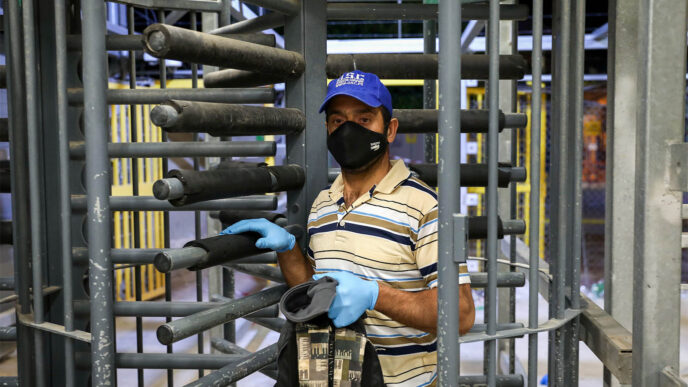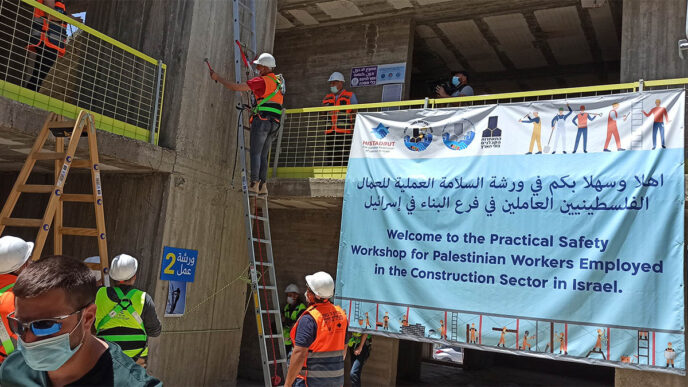
A new regulation of the Population and Immigration Authority will eliminate the shackling of Palestinian workers in Israel’s construction industry to their employers, and will allow them to switch between different employers for whom they have a work permit.
Approximately 80,000 Palestinian workers cross the border into Israel every day, most of them through four heavily guarded border checkpoints. Most Palestinians working in Israel are employed in the construction industry. Even though wages in that industry are low by Israeli standards, they are substantially higher than the average wage in the West Bank. The relatively high wages and tight restrictions imposed by the Israeli authorities make the visas issued to Palestinian workers a rare asset in the Palestinian Territories.

Until now, work permit allocations have been given to Israeli contractors, who would then hire Palestinian workers, meaning that their employment in Israel depended on their specific employer. The Israeli employer would then organize transport from the border crosses to the work sites, and is officially responsible for the workers’ welfare, until the contract ends.
For security reasons, Israeli authorities issue work visas mostly to older, married men with families back home who are deemed less likely to participate in terrorist attacks. The Palestinian Authority has no pension plan, which means that often the wages paid to a Palestinian working in Israel will go towards supporting his parents and his wife's parents, on top of his own nuclear family.
But visas are mostly out of sync with the demand for workers. Israeli authorities issue work visas for arbitrary periods that don't correspond to the contracts themselves. Employers will often let Palestinian workers go before their permit expires. In these cases, instead of informing the authorities, the Israeli employer illegally "sells" the permit to the Palestinian worker, for as much as 2,500 shekel ($740), which can come out to as much as half their salaries. The workers can then continue crossing the border to work, without having to apply for a new permit.
Palestinian workers are willing to pay the exorbitant fees for their visas because of the higher wages in Israel. But working for a new employer without reporting to the Israeli authorities means that the workers are in constant danger of losing their visa, a fact that employers use to their advantage. Employers, holding considerable power over their workers, can ignore safety regulations and neglect working conditions.

"In many cases, employers will do anything to cheat workers out of their wages," says Amihai Satinger, head of the unionization division of the Histadrut. "These Palestinian workers have no insurance, no pension payments, and on top of that, in many cases they have to pay for their own transport from the border. Add that to the price they pay to get hold of the permit itself, and you get a worker earning 4,000 shekel ($1,170) when by law he should be earning 9,000 shekel ($2,600)".
The decision to advance the new regulation was approved by the government as early as 2016, but its implementation has so far been postponed time and time again due to budgetary considerations. The State Comptroller's report last August advocated for this reform, as well as a petition filed to the Supreme Court last September by Kav LaOved, a workers’ advocacy organization.
"The illegal binding of workers to their employers will be abolished.”
Under the new regulations, a Palestinian worker with a work permit will be able to work for any Israeli contractor registered under the employment permit principles, as long as the work is in the residential construction industry and the contractor agrees to employ them full time for at least one month. After it takes effect, the name of a specific contractor will not appear on the work permits that the Palestinian workers receive. These regulations are meant to reduce the power of the individual employer over the worker, and allow the worker more freedom and agency to move between employers.
An employee who has been fired or left their employer will only be able to enter Israel through a one-week job search permit. If he does not find a new job with a registered contractor within 60 days, he will lose his work permit. His return to the pool of authorized workers will only be allowed on condition of a new vacancy in the quota of authorized workers approved by the government. The purpose of this measure is to reduce illegal speculation in work permits.
The employment permits that will now be issued to employers will not be limited to a numerical quota of Palestinian workers, and they will be able to employ as many such workers as they wish to work for them. In this way, competition between employers for employees is expected to increase, and with it the workers' working conditions and their ability to insist on the adhering of safety regulations.

The employment of Palestinian workers will continue to be in accordance with the labor laws established in Israel, but the new regulations determine that the employment of Palestinian workers will now only be done through direct employment and not through human resources contractors.
A statement from Kav LaOved reads: "There is still a lot of work to be done – we must ensure that a system is set up that will allow employees to look for work independently in order to prevent illegal mediation. We should ensure that no one continues to find indirect ways to extort money from employees. No less important – the Palestinian workers must be informed of the decision. Still, as of December 6, we have reason for hope: the illegal binding of workers to their employers will be abolished.”






